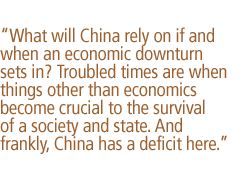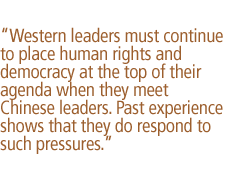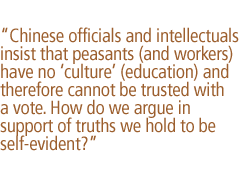| 
Second, to suggest that the reason a country such as Indonesia fell apart was because it lacked democracy may or may not be correct. But if it is, then how to explain why India, which has had a democratic system since 1947, has not been able to pull itself together? Why has Indian democracy not produced a government that is willing to address the problems of its people? Malnutrition in India is remediable; that is, India has the food to feed all its people, but it does not. The result is that malnutrition remains at unconscionably high levels while grain rots in the fields because of government policies. According to United Nations data, the mortality rate for those under age 5 (per 1,000 live births) is 47 for China, 105 for India. After half a century of democratic rule in India and authoritarian rule in China, the adult illiteracy rate (age 15 and above, as of 1998) is 17.2 percent for China, and 44.3 percent for India. India has done nothing to control its soaring population growth, and it has still not abolished the caste system in practice. And so on. Can one say that Indian democracy has fulfilled the social and economic rights of its people better than has China's political system, or that political rights for Indians have preserved human dignity?
So, then, what is the problem and the cure? In truth, China has lots of problems, and a panacea-type response like "democratization" doesn't address the issues. Take, for example, some of the industries now threatened with bankruptcy because of international competition. How would "democratization" help them? How would democratization solve the problem of massive unemployment resulting from the shut-down of state-owned enterprises? Or take the financial sector. State-owned banks are on the verge of bankruptcy, a lot of it tied to forced underwriting of state-owned enterprises. How would "democratization" address this problem? How would democratic theory speak to the issue of the relationship of industries to banks or government in a society making the transition from a socialist to a capitalist economy? What China needs are specific financial reforms, including strategies that enhance transparency, such as greater supervision and oversight, independent auditors, and appropriate accounting procedures. Problems must be addressed issue-by-issue and step-by-step. Meaningful reforms can be made under any form of government. There is no guarantee that a democratic government will be more willing to undertake them than an authoritarian one, as the resistance of the Japanese government to such financial reforms makes all too clear.
The real problem may well be corruption, but I find it hard to accept that it is solely the government that needs to mend its ways. Corruption is at this point rampant in China, permeating deeply into society. It will take more to end corruption than changing the form of government from authoritarian to democratic. China's form of corruption feeds on familial and personal relationships, and these are at the heart of Chinese culture. So to address corruption means tackling cultural change -- no easy feat for a 5,000-year-old civilization. In the meantime, step-by-step institutional reforms that provide for greater oversight and transparency, and perhaps higher salaries for the police, the judiciary, and those serving in other squeeze points, may be the best medicine.
Finally, I wholeheartedly endorse the view that perceptions are what matter. Thus, as Anne Thurston said, "the Party continues to be more legitimate than we might expect," and "the nature of Chinese legitimacy is greatly different from our own." Reality is as the Chinese have constructed it. Similarly, I would argue, if the CCP's propaganda machine has managed to convince the people that wholesale democratization could produce chaos, then for the Chinese people, that is the truth of the situation. For whatever reason, the Chinese believe what they believe.
I also do not think we should stand in judgment of Chinese people who prefer economic growth, which they believe requires stability, to political democratization, which they believe could be quite destabilizing. It is all so easy for us to sit here and say, "That's not good enough," when we have never experienced political and social upheaval. If economic growth suddenly falters, what proof do they have that a democratic government would have dealt with the issues better? Certainly their understanding of what happened in Russia and the former Soviet republics would not lead them to this conclusion; nor would their knowledge that Taiwan, Hong Kong, Singapore, and South Korea all achieved rapid growth under authoritarian systems.

• • •

Dean of the Graduate School of Journalism at the University of California at Berkeley and the author of nine books about China, including Virtual Tibet (2000), Mandate of Heaven (1994), and Discos and Democracy (1988).

China has always had a dispensation by way of "exceptionalism," meaning that it was not held to the operating principles that seemed to govern everyone else. Confucian China was always considered other, inscrutable, unknowable, and not subject to the same pleasure/pain principles of the West. During the Cultural Revolution, many Westerners thought that Mao had discovered some new miraculous path to development that belied all the corrupt development models of the industrialized world.
And now we have another version, which suggests that the Chinese economy has found some new remedy for rapid growth that will make it immune to all contagion, such as that which brought down Southeast Asia in 1996, deflation in Japan, and even the downturn in the U.S. and Europe. Thus we might say that the most recent version of Chinese exceptionalism is the presumption that somehow the Chinese economy is lighter than air, and will remain invulnerable to all of the normal imperatives of other economies.
This may yet prove to be true. Indeed, they have had a remarkable run. People look back at the past two decades, especially the most recent decade -- since 1992, when Deng Xiaoping kicked-started the market economy again after the catastrophe of 1989 -- and are amazed. Judgment all too easily gets suspended.
However, it would not be excessive to say that everything -- economic health, social stability, political reform, environmental modernization, etc. -- all depend on China's economy maintaining at least a 6 percent to 7 percent growth rate. This is something that most market economies cannot do in perpetuity given the nature of cyclical growth cycles.
So, why should China be any different? Remember the Silicon Valley bubble, when the terms of the economic game were said to have been changed by the IT revolution? Remember the so-called "long-boom," when people thought cycles had ended and the good times would be close to eternal? Such recognitions are sobering and make one wonder, what will China rely on if and when an economic downturn sets in? Its rationalized and legitimized political system? Its just court system? Its deeply-rooted system of shared values? Its religious unity? Its collective sense of Chinese political identity, purpose, and willingness to share sacrifice for the commonweal?
Troubled times are when things other than economics become crucial to the survival of a society and state. And frankly, China has a deficit here.
China has recently fared well, but has also had a measure of good fortune. The question that one must ask about the future and the prospects for democratization is: If China cannot democratize more demonstrably in this upward business climate, how well might it be expected to do in a downward economic climate? At such a time, we may find the notion of "exceptionalism" fails China.

• • •


Senior associate at the Carnegie Endowment for International Peace specializing in China's domestic politics and the author of From Reform to Revolution: The Demise of Communism in China and the Soviet Union (1994).

Suzanne Ogden raised an important issue -- the evaluation of China's progress since 1979 should not be made exclusively on the basis of the degree of democracy in China. But I think the real issue for us today is not how to evaluate China, but to assess whether the policies and strategies that have enabled China to achieve so much can be sustained without change.
A more useful way of looking at this issue is to use the metaphor of "racing against time." As we all know, China's rapid modernization has also unleashed powerful forces that must be harnessed. These include ever-rising popular expectations, fraying social fabric, growing dependence on the global marketplace, increasing inequality, and progressive decay of the old authoritarian political institutions. At the moment, high economic growth rates help remedy, only to a limited extent, these problems. To maintain social stability and economic momentum, China's leaders must either accelerate the speed of reform or do something to stop the rot inside the system. Otherwise, they will lose this race against time.
So I think it is actually healthy for the outside world to be a bit more critical about China, especially about its leaders' resistance to democratic reforms. We are not expecting China to be a Denmark overnight. But the introduction of some democratic reforms -- such as the rule of law, freedom of the press, and competitive elections at the local level -- could help not only to improve human rights, but to enhance social stability. It is in the self-interest of the regime to do so.
What Anne Thurston has said suggests that some elements inside the regime may be thinking along those lines. Anne was right to single out the importance of political legitimacy, and urged us to look seriously at the Communist Party's efforts to find a new ideological basis of legitimacy. The new ideological formulation -- the so-called "three represents" -- is linguistically awkward (that's why fewer than 2 percent of ordinary Chinese people, according to a poll, can tell you what the three represents stand for). But the fact that the Communist Party is trying to find a new ideological home may be taken as either a sign of hope or evidence of desperation.
Whatever the case, ideological reformulation must be followed by action. Empty rhetoric is not going to save the Communist Party or make it truly legitimate. Although the Party may appear to be more inclusive now, the real test is not inclusiveness, but competition. This is because a monopolistic Party can choose whom to include (or co-opt). The lucky ones, such as the entrepreneurs today, may be included. But what about those who are left out, such as the unemployed and the poor? It is impossible to include everyone in a ruling party. Only political competition can make the Party really accountable and responsive. So for the moment, we should maintain a healthy dose of skepticism about the Party's intentions and resolve.
Finally, we should talk about what the outside world can do to help China win this race against time. Obviously, what the West can do for a country of 1.3 billion people is very limited. But given China's increasing dependence on the world economy and growing integration into the international community, there are quite a few measures that can be taken to help accelerate reforms inside China.
First, top Western leaders must continue to place the issue of human rights and democracy at the top of their agenda when they meet Chinese leaders. Past experience shows that they do respond to such pressures. Of course, diplomatic criticisms must also be accompanied by offers of assistance, such as measures to improve the enforcement of workplace safety rules, education for children of migrants, and so on. For China, such a dual-track approach may be easier to swallow.
Second, the expanding presence of Western business in China (last year foreign investors poured $50 billion into China) should be made a valuable resource for the improvements in human rights. If nothing else, Western companies should not only stick to strict labor and environmental standards themselves, but force their Chinese suppliers to accept similar standards as a condition of doing business.
Third, the Western media can help as well. Increasingly, ordinary Chinese people are turning to Western reporters to air their grievances and expose local corruption. For example, The New York Times did a terrific job in exposing the AIDS epidemic in Henan province. Even though the Chinese officialdom does not like such negative coverage, it does bring unwanted international attention to serious social problems and can, on some occasions, force action.

• • •


Professor of China Studies at Johns Hopkins University's School of Advanced International Studies (SAIS) and author of The Private Life of Chairman Mao (1994), A Chinese Odyssey (1991), and most recently, Muddling Toward Democracy: Political Change in Grassroots China (1998).

In reflecting on my colleagues' remarks, two questions come to mind. What arguments might persuade reluctant Chinese that democracy is in their interests? And what role might the United States play in encouraging the process?
Unfortunately, the most persuasive arguments in favor of democracy are more likely to be instrumental than principled. And any argument must address the Chinese preoccupation with stability. Jiang Zemin has declared that Western-style democracy would bring chaos to China, undermining the process of development. Chinese democrats have argued to the contrary. Wei Jingsheng's article on the "Fifth Modernization," posted on the Democracy Wall in 1978, argued that dictatorship rather than democracy causes chaos. More recently, the debates about village elections also centered on the issue of stability. Those opposed to village elections argued that only tighter Party control at the lowest levels of society could restore order. Proponents argued that popularly elected village leaders could not only restore order but also facilitate implementation of such difficult government policies as family planning and tax collection. Moreover, they argued, competitive elections at the village level could help re-legitimize the Party. Elected village leaders could be recruited into the Party, thus infusing its ranks with more popular and probably more competent and less corrupt individuals. Interestingly, the "democracy promotes stability" argument won.
The same arguments in favor village-level democracy hold for higher levels as well. As corruption within the Party eats away at its legitimacy, the need for an external, ongoing process of cleansing becomes increasingly urgent. While our own history amply demonstrates that elections are no guarantee that the "good guys" always win, surely no other process has proven more effective in the long run. With the type of plan proposed by Orville Schell in his remarks, the crisis that Pei Minxin sees in his might be averted. And stability, as well as the party's legitimacy, might be saved. Only by subjecting itself to the popular will, and thus risking being voted out, could the Party be forced to reform itself sufficiently to stay in office. The nationalist party (Guomindang) of Taiwan, of course, is the Chinese example of a party that risked being destroyed in order to save itself. The fact that it won on the first round and lost in the second may suggest less that the gamble did not pay off than that the earlier the process of democratization begins, the more likely the party-in-decline is to reform itself sufficiently to remain in power.
But "democracy promotes stability" is only the first of instrumental arguments that might be made. Skeptical Chinese must also be convinced that democratization would be more effective in addressing the country's most pressing current problems -- growing inequality between rich and poor, rising unemployment, and implementation of the requirements of the WTO, for instance. These arguments are more difficult, perhaps, but can be persuasively made. Studies of poverty alleviation suggest that government-organized projects are generally less successful than those undertaken by non-governmental organizations with the full participation of the poor. Surely the unrest being generated by China's rising unemployment could be mitigated by the introduction of autonomous trade unions which would both treat the concerns of the disaffected as legitimate and transform protest into bargaining. Accession to WTO will be smoother under a genuine rule of law. Tax collection and redistributive policies are easier to implement in democracies.
In the end, however, instrumental arguments may not be sufficient. The issue of political culture raised by Suzanne Ogden must also be addressed. I wonder whether some sense of "all men (and women) are created equal" -- and capable of making decisions for themselves -- is essential to successful democracy. How many times have I heard Chinese officials and intellectuals insist that peasants (and workers) have no "culture" (education) and therefore cannot be trusted with a vote? How would the international community react to a Chinese democracy limited to those with a prescribed level of educational attainment? And how do we argue in support of truths we hold to be self-evident?
Which leads to the final question of what role the United States might play in China's political development. A return to humility and a re-reading Jonathan Spence's To Change China (for its cautionary tales about those who traveled to China to change it) would be a good start. But the fact is that many American NGOs are working cooperatively in China to promote political change -- the Ford Foundation, the Asia Foundation, the International Republican Institute, the National Democratic Institute, and the Carter Center, for instance. And scattered around China are individuals and small groups working quietly and cooperatively -- and making a difference.
 | |